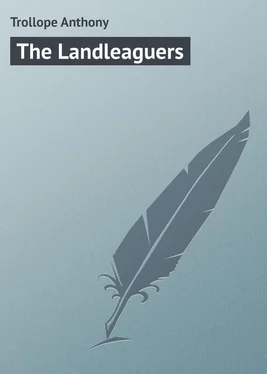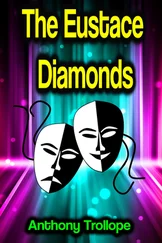Anthony Trollope - The Landleaguers
Здесь есть возможность читать онлайн «Anthony Trollope - The Landleaguers» — ознакомительный отрывок электронной книги совершенно бесплатно, а после прочтения отрывка купить полную версию. В некоторых случаях можно слушать аудио, скачать через торрент в формате fb2 и присутствует краткое содержание. Жанр: foreign_prose, на английском языке. Описание произведения, (предисловие) а так же отзывы посетителей доступны на портале библиотеки ЛибКат.
- Название:The Landleaguers
- Автор:
- Жанр:
- Год:неизвестен
- ISBN:нет данных
- Рейтинг книги:4 / 5. Голосов: 1
-
Избранное:Добавить в избранное
- Отзывы:
-
Ваша оценка:
- 80
- 1
- 2
- 3
- 4
- 5
The Landleaguers: краткое содержание, описание и аннотация
Предлагаем к чтению аннотацию, описание, краткое содержание или предисловие (зависит от того, что написал сам автор книги «The Landleaguers»). Если вы не нашли необходимую информацию о книге — напишите в комментариях, мы постараемся отыскать её.
The Landleaguers — читать онлайн ознакомительный отрывок
Ниже представлен текст книги, разбитый по страницам. Система сохранения места последней прочитанной страницы, позволяет с удобством читать онлайн бесплатно книгу «The Landleaguers», без необходимости каждый раз заново искать на чём Вы остановились. Поставьте закладку, и сможете в любой момент перейти на страницу, на которой закончили чтение.
Интервал:
Закладка:
Trollope Anthony
The Landleaguers
VOLUME I
NOTE
This novel was to have contained sixty chapters. My father had written as much as is now published before his last illness. It will be seen that he had not finished the forty-ninth chapter; and the fragmentary portion of that chapter stands now just as he left it. He left no materials from which the tale could be completed, and no attempt at completion will be made. At the end of the third volume I have stated what were his intentions with regard to certain people in the story; but beyond what is there said I know nothing.
HENRY M. TROLLOPE.CHAPTER I.
MR. JONES OF CASTLE MORONY
In the year 1850 the two estates of Ballintubber and Morony were sold to Mr. Philip Jones, under the Estates Court, which had then been established. They had been the property of two different owners, but lay conveniently so as to make one possession for one proprietor. They were in the County Galway, and lay to the right and left of the road which runs down from the little town of Headford to Lough Corrib. At the time when the purchase was made there was no quieter spot in all Ireland, or one in which the lawful requirements of a landlord were more readily performed by a poor and obedient tenantry. The people were all Roman Catholics, were for the most part uneducated, and it may be said of them that not only were their souls not their own, but that they were not ambitious even of possessing their own bodies. Circumstances have changed much with them since that date. Not only have they in part repudiated the power of the priest as to their souls, but, in compliance with teaching which has come to them from America, they claim to be masters also of their bodies. Never were a people less fitted to exercise such dominion without control. Generous, kindly, impulsive, and docile, they have been willing to follow any recognised leader. When Philip Jones bought the property that had belonged to the widow O'Dwyer – for Ballintubber had for the last hundred years been the property of the O'Dwyers – and Morony, which, had been an outlying town-land belonging to the Hacketts for the last two centuries, he had at first been looked down upon as a new comer. But all that had passed by, and Mr. Jones was as much respected as though he had been an O'Jones from the time of Queen Elizabeth. But now the American teaching had come up, and things were different.
Mr. Jones had expended over £30,000 in purchasing the property, and was congratulated by all men on having done well with his money. There were some among his friends in England – and his friends were all English – who had told him that he was incurring a great risk in going into so distant and wild a country. But it was acknowledged that he could not in England have obtained so good a return in the way of rent. And it was soon found that the opportunities for improving the property were many and close at hand. At the end of ten years all men who knew Mr. Jones personally, or had seen the increasing comforts of Morony Castle, declared that, as he liked the kind of life, he had done uncommonly well for himself.
Nor had he done badly for his three married sisters, each of whom had left £4,000 in his hands. All the circumstances of the Miss Jones's as they had been, it will be here unnecessary to explain. Since Philip had become owner of Morony Castle, each of them had married, and the three brothers-in-law were equally well satisfied with the investment of their money. It will, however, thus be understood that the property did not belong entirely to Mr. Jones, and that the brothers-in-law and their wives were part owners. Mr. Jones, however, had been in possession of some other means, and had been able to use capital in improving the estate. But he was an aspiring man, and in addition to his money had borrowed something beyond. The sum borrowed, however, had been so small and so well expended, as to have created no sense of embarrassment in his mind.
When our story commences he was the father of four children. The elder and the younger were boys, and two girls came between them. In 1880, Frank, the elder, was two-and-twenty. The two girls who followed close after were twenty and nineteen, and the youngest boy, who was born after an interval of nearly ten years, was but ten years old. Some years after the mother had died, and Mr. Jones had since lived as a widower. It may be as well to state here that in 1880 he was fifty-five years old.
When his wife had died, the nature of the man had apparently been changed. Of all men he had been the most cheerful, the most eager, and the most easily pleased. He had worked hard at his property, and had loved his work. He knew every man and woman about the place, and always had a word to say to them. He had had a sailing boat on the lake, in which he had spent much of his time, but his wife had always been with him. Since her death he had hardly put his foot within the boat. He had lately become quick and short-tempered, but always with a visible attempt to be kind to those around him. But people said of him that since his wife had died he had shown an indifference to the affairs of the world. He was anxious – so it was said – to leave matters as much as possible to his son; but, as has been already stated, his son was only twenty-two. He had formerly taken a great pleasure in attending the assizes at Galway. He had been named as a grand juror for the county, which he had indeed regarded as a great compliment; but since his wife's death he had not once attended.
People said of him that he had become indifferent to the work of his life, but in this they hardly spoke the truth. He had become indifferent rather to what had been its pleasures. To that which his conscience told him was its work, he applied himself with assiduity enough. There were two cares which sat near his heart: first, that no one should rob him; and secondly, that he should rob no one. It will often be the case that the first will look after itself, whereas the second will require careful watching. It was certainly the case with Philip Jones that he was most anxious to rob no one. He was, perhaps, a little too anxious that no one should rob him.
A few words must be said of his children. Frank, the eldest, was a good-looking, clever boy, who had been educated at the Queen's College, at Galway, and would have been better trained to meet the world had circumstances enabled him to be sent to a public school in England. As it was he thought himself, as heir to Morony Castle, to be a little god upon earth; and he thought also that it behoved his sisters and his brother, and the various dependents about the place, to treat him as though he were a god. To his father he was respectful, and fairly obedient in all matters, save one. As to that one matter, from which arose some trouble, much will have to be said as the story goes on.
The two girls were named Ada and Edith, and were, in form and figure, very unlike each other. Ada, the eldest, was tall, fair-haired, and very lovely. It was admitted in County Galway that among the Galway lasses no girl exceeded Ada Jones in brightness of beauty. She was sweet-tempered also, and gracious as she was lovely. But Edith did not share the gifts, which the fairy had bestowed upon her sister, in equal parts. She was, however, clever, and kind, and affectionate. In all matters, within the house, she was ready to accept a situation below her sister's; but this was not by her sister's doing. The demigod of the family seemed to assume this position, but on Ada's part there was no assumption. Edith, however, felt her infirmity. Among girls this is made to depend more on physical beauty than on other gifts, and there was no doubt that in this respect Edith was the inferior. She was dark, and small of stature, not ungraceful in her movements, or awkward in her person. She was black-haired, as had been her mother's, and almost swarthy in her complexion, and there was a squareness about her chin which robbed her face of much of its feminine softness. But her eyes were very bright, and when she would laugh, or say something intended to make another laugh, her face would be brightened up with fun, good-humour, or wit, in a manner which enabled no one to call her plain.
Читать дальшеИнтервал:
Закладка:
Похожие книги на «The Landleaguers»
Представляем Вашему вниманию похожие книги на «The Landleaguers» списком для выбора. Мы отобрали схожую по названию и смыслу литературу в надежде предоставить читателям больше вариантов отыскать новые, интересные, ещё непрочитанные произведения.
Обсуждение, отзывы о книге «The Landleaguers» и просто собственные мнения читателей. Оставьте ваши комментарии, напишите, что Вы думаете о произведении, его смысле или главных героях. Укажите что конкретно понравилось, а что нет, и почему Вы так считаете.












